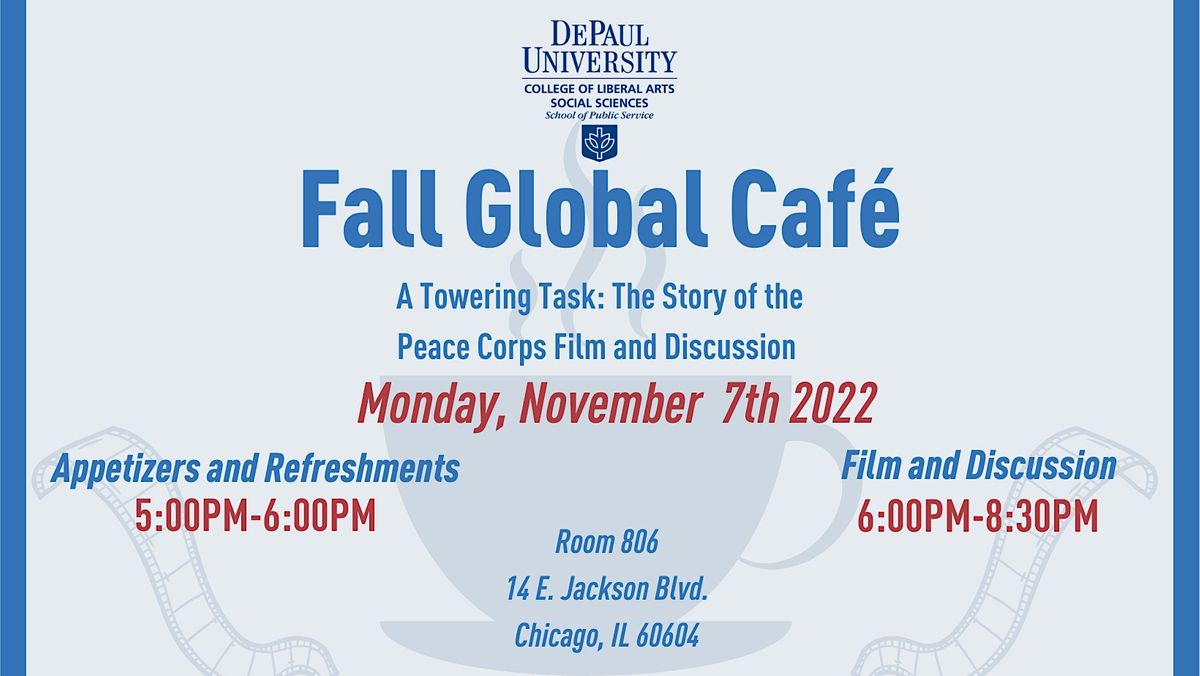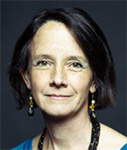A Towering Task: The Story of the Peace Corps
Film Screening & Discussion
Mon Nov 07 2022 at 05:00 pm to 08:30 pm
DePaul University – Richard M. and Maggie C. Daley Building | Chicago, IL

What role should the Peace Corps play in the 21st century? Come view the film and share your thoughts about the future of the Peace Corps.
A Towering Task is an independent documentary produced and directed by Alana DeJoseph (Mali 1992-94), a returned Peace Corps volunteer and documentary filmmaker. She has been a member of the production teams that produced The Greatest Good: A Forest Service Centennial Film and Green Fire: Aldo Leopold and a Land Ethic for our Time. She works alongside Dave Steinke (film producer, cameraman and former Forest Service public affairs director) and Shana Kelly (screenwriter and book editor). All three strongly believe in the urgent need for an objective, in-depth look at the history and future of the Peace Corps.
Founded during the Cold War, the Peace Corps stands as an icon of American idealism. From the beginning its mission of world peace and friendship proved to be a towering task. Imbued with the unbounded energy and vision of its charismatic leader, Sargent Shriver, and thousands of vigorous volunteers, the story of the Peace Corps is a uniquely American tale. From the political machinations to establish not just a brand new government agency, but a new concept in international relations, to the growing pains of an agency striving to define its mission. A Towering Task takes viewers on a journey of what it means to be a global citizen.
Host country nationals, Peace Corps Volunteers and staff, and scholars and journalists take a closer look at peace building, economic development and political independence through the Peace Corps’ nearly six decades of trials and transformations. Before being evacuated because of the pandemic, Peace Corps volunteers were serving in over 60 countries and more than 200,000 have returned since 1961, but America is reevaluating how to engage with the rest of the world.
Now, as the Peace Corps rebuilds with increased nationalistic tendencies in America and around the globe, and Peace Corps Volunteers at the forefront of some of the most pressing themes facing the global community, A Towering Task asks:
What role should the Peace Corps play in the 21st century?
We invite you to view the film and share your thoughts at this free screening and discussion hosted by DePaul University’s School of Public Service.
5:00pm – 6:00pm: Appetizers and Refreshments
6:00pm – 8:30pm: Film Screening & Discussion

As new PC Volunteers were assigned to the field following Covid-19, it would seem that most of them will be teaching English, even in Belize, where it is the ‘national language’. But … to what end!
Perhaps a partial answer to that issue is to review a program that was initiated with teaching English and then transition into its use in a larger and highly competitive technological context. In the 1960s, one Volunteer in Colombia helped villagers build their first school. Then, this Volunteer formed a Foundation. It promotes education for underprivileged youth as the best way to empower them to build their own futures. Its mission is to give its students and teachers the tools to compete in the 21st Century. By 2020, that mission has resulted in 585 teachers being trained variously in technology, socio emotional abilities, English, STEM and Robotics. Its impact on students has been equally impressive with 3,400 trained in English, 4,000 in technology, 1005 in STEM and Robotics, 485 in Vocational Training and 20 that won scholarships to pursue a higher education degree. It also introduced them to XO Laptops. The Foundation’s IT program has connected children in rural communities and others who live in some of the more remote areas of Colombia so they and their families can see and use computers for the first time. They take these computers home and in this manner their parents can also learn to bridge the technological gap.
Over 40% of its Robotic students are girls. In time, this one room school house of the 1960s became the seed that blossomed into programs for 32 public schools in the Medellin area, opening doors for thousands of underprivileged children to compete in a fast moving technological environment of artificial intelligence and robotis.
The teaching of English became the door that permitted the Foundation’s children to secure future jobs and careers.
Jeremiah, The RPCV is has done such a remarkable job in Colombia, is, of course, Maureen Orth. Recently, she was made a honorary citizen of Colombia.
I think Peace Corps has been most successfull in education programs and teaching English. The value of education and the value of speaking English are American values which we share with the whole world.
Thanks to Alana and her team for this critical important documentary. It increases daily with its importance of the history of Peace Corps.
I have recommended this film to so many. The mission of many of the volunteers of Peace Corps still speaks today. The pandemic has forced Peace Corps to push the restart button. Becoming a global citizen is still vital but how we proceed forward today will have a new path. As a Peace Corps volunteer from 1971 to 74 in Liberia and Tonga I urge new volunteers and Peace Corps staff to find a way to bridge the necessity of human connection. We need it now more than we ever have. You must go beyond the bombs and bullets of destruction.
Does anyone know how we access the film on TV or online?
G.
Hi Gary, We are currently working with several PBS stations to get the film into broadcast hopefully within a few months. Once that’s done, all you should have to do is call your local PBS station. (If enough people call, they will schedule it into their lineup.)
In the meantime, let us know where you are and we can try to work with the university in your area to show the film. You can contact us through our website at https://www.peacecorpsdocumentary.com/contact
Best.
Alana